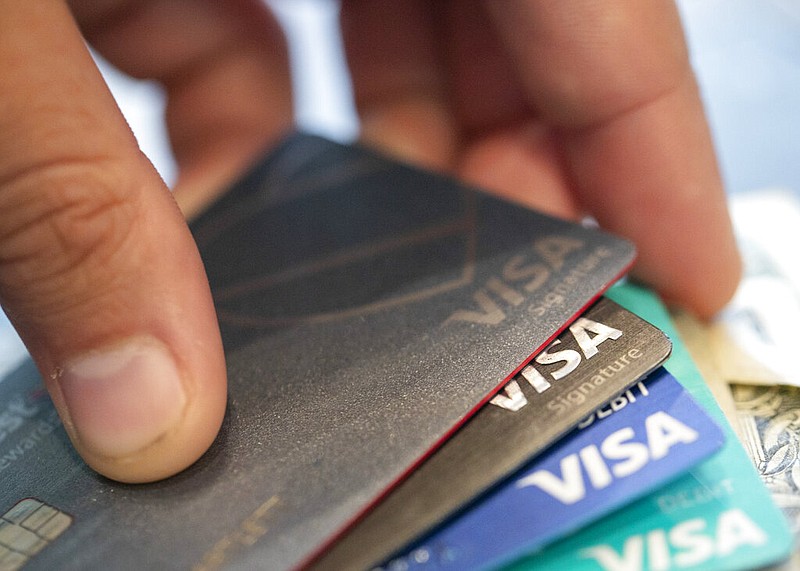Arkansans who pay for a restaurant meal, car repairs or a new outfit with a credit card may not even notice they're paying extra for the convenience.
But as credit card issuers like Visa and Mastercard keep raising the fees they charge business owners each time they "swipe" a customer's card, many merchants find it necessary to try to recoup some of that money with a surcharge on the card user's tab.
Congress is trying to bring some relief to business owners, but credit card companies and their banks have created a strong network that's loath to yield to competition.
Eric Herget, who with his wife, Lou Anne, owns Heights Corner Market in Little Rock, said a 3.5% surcharge was added about Sept. 1. The fee only applies to credit card payments, not those made with cash or debit cards.
Their credit card processing company set the surcharge percentage, he said. And if he could find one that charged less, he'd have to buy all new point-of-sale equipment -- yet another expense for the small business.
Herget said they'd held off on the surcharge as long as they could, but inflation finally forced their hand. The tipping point, he said, came when the store's rent went up.
"Inflation's running 8% to 9%, so our rent goes up 8% or 9%," he said. "It finally gets to the point where we cannot absorb all of these expenses anymore."
"If someone pays cash on something for a dollar, then I get a dollar," Herget said. "If they use the card, then I get 95 cents. We have to capture that nickel now."
"A larger store has negotiating power with those [credit card] companies," Herget said. "Someone our size, we just have to do whatever they tell us."
His customers haven't seemed bothered by the new policy. In the weeks since the store implemented the surcharge, Herget said, only one has commented on it.
"And it was just a comment," he said. "No one else has said a word about it."
Herget is also outgoing chairman of the Arkansas Grocers & Retail Merchants Association.
"To date," he said, "this issue has not been discussed at our association."
"They're probably waiting for one of the big stores to be the first to jump out there," Herget said. "Then everybody else will jump in."
Other businesses contacted were reluctant to discuss the matter.
The McLarty Daniel auto dealership in Bentonville has notices posted in its automotive repair department about a 3.5% surcharge on credit card transactions, but a manager there declined to comment on the policy.
Several Northwest Arkansas restaurants also declined to comment.
The surcharges consumers are seeing stem from forces far removed from their local store or restaurant.
Credit card companies, dominated by Visa and Mastercard, set the fees that all banks that issue their cards must charge merchants every time they accept a card payment. The fees apply not only to in-store sales but also to online and most buy-online, pickup-in-store purchases.
Swipe fees are the highest operating cost after labor for many retailers, according to the National Retail Association. The fees average just over 2% but can run as high as 4% for some premium rewards cards, the industry trade group said.
"Small retailers are hardest hit by high credit card swipe fees, especially during this period of inflation," the National Retail Federation said. "They pay the highest swipe fees in the industrialized world but have the fewest resources to fight back against global credit card networks and Wall Street banks."
"As such, they want to see competition in the payments market more than anyone," the federation said.
The trade group said the swipe fees banks have collected from businesses have grown from about $20 billion a year in 2001 when it began tracking them to $137.8 billion in 2021.
This past April, Visa and Mastercard raised swipe fees by another $1.2 billion.
Credit card surcharges can be applied to payments made in person, online or over the phone, according to Bankrate.com. The surcharges are legal in most states, including Arkansas, but businesses must post a notice at the point of sale and on customers' receipts.
In Oklahoma, on the other hand, credit card surcharges are illegal for most businesses. The only exception is for sellers registered with the U.S. Treasury Department as money transmitters.
Congressional lawmakers are lobbied from both sides, with retailers asking for relief from the swipe fees and credit card issuers looking to raise them and opposing any attempt to cut or put a cap on them.
A month after April's swipe fee increases, U.S. Sen. Richard Durbin, D-Ill., called a hearing on the fees and barriers to competition in the credit card system. A video of the hearing can be viewed at https://tinyurl.com/53hsc2m3.
Durbin said the credit card processing network that Visa and Mastercard have created crowds out competitors that would give merchants a choice of networks and possibly lower fees.
On July 28, Durbin and U.S. Sen. Roger Marshall, R-Kan., introduced the bipartisan Credit Card Competition Act of 2022. The bill would direct the Federal Reserve to require credit card issuers to offer merchants one or more alternative card-processing networks.
That bill has been referred to the Senate Committee on Banking, Housing and Urban Affairs.

